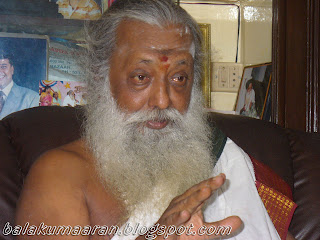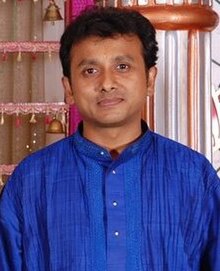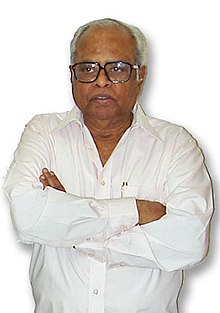P.J.
0
Tributes to Maharajapuram SANTHANAM (Born: December 3, 1928,-Died: June 24, 1992)
Tributes to Maharajapuram SANTHANAM (Born: December 3, 1928,-Died: June 24, 1992)
https://www.youtube.com/watch?v=UPaxX-Ay-5E&list=PLdjEKV9TOg7o9uZxzoLqvxXIAdakHwdx6
Published on Sep 22, 2013
Maharajapuram Santhanam
Sangeetha Kalanidhi Maharajapuram Santhanam (Tamil: மகாராஜபுரம் ஸந்தானம்), (December 3, 1928[SUP][/SUP]-June 24, 1992[SUP][[/SUP]) was one of the great Carnatic music vocalists of the 20th century. He was born in Sirunangur, a village in the state of Tamil Nadu. He followed the footsteps of his father Maharajapuram Viswanatha Iyer who was also a Carnatic singer.
Besides studying with his father, he was also a disciple of Melattur Sama Dikshitar. Maharajapuram Santhanam was also a distinguished composer. He wrote many songs on Lord Murugan and Kanchi Shankaracharya, His Holiness Sri Chandrasekarendra Saraswati Swamigal (Maha Periyavar). He was the Principal of Ramanathan College in Sri Lanka.[SUP]
[/SUP] Later he came and settled in Chennai. The songs which were popularised by Maharajapuram Santhanam are,"Bho Shambo" (Revati), "Madhura Madhura" (Bagheshri), both composed by Swami Dayananda Saraswati, "Unnai Allal" (Kalyani Raga), "Sadha Nin Padhame gathi, Varam onnru" (Shanmukhapriya), "Srichakra Raja" (Ragamalika), "Nalinakaanthimathim" (Ragamalika),"Ksheerabdi kannike" (Ragamalika) among others. The Maharajapuram Santhanam Day is celebrated on the 3rd of December every year.
He died in a car accident on June 24, 1992. His sons Maharajapuram S. Srinivasan, Maharajapuram S. Ramachandran, and his primary disciple Dr. R. Ganesh are now carrying on his musical tradition.
His other most popular songs are Purandaradasa kritis: "Narayana ninna" (Shuddha Dhanyasi) and "Govinda ninna". His rendition of "Vilayada ithu nerama muruga" was without parallel. His renditions were full of Bhakthi.
In Chennai, Griffith Road in T.Nagar was renamed as 'Maharajapuram Santhanam Salai' in honor of Maharajapuram Santhanam, by Karunanidhi and Stalin. The street has the famous Krishna Gana Sabha and Muppathamman Temple.
Awards
https://en.wikipedia.org/wiki/Maharajapuram_Santhanam
Tributes to Maharajapuram SANTHANAM (Born: December 3, 1928,-Died: June 24, 1992)
https://www.youtube.com/watch?v=UPaxX-Ay-5E&list=PLdjEKV9TOg7o9uZxzoLqvxXIAdakHwdx6
Published on Sep 22, 2013
Maharajapuram Santhanam
Sangeetha Kalanidhi Maharajapuram Santhanam (Tamil: மகாராஜபுரம் ஸந்தானம்), (December 3, 1928[SUP][/SUP]-June 24, 1992[SUP][[/SUP]) was one of the great Carnatic music vocalists of the 20th century. He was born in Sirunangur, a village in the state of Tamil Nadu. He followed the footsteps of his father Maharajapuram Viswanatha Iyer who was also a Carnatic singer.
Besides studying with his father, he was also a disciple of Melattur Sama Dikshitar. Maharajapuram Santhanam was also a distinguished composer. He wrote many songs on Lord Murugan and Kanchi Shankaracharya, His Holiness Sri Chandrasekarendra Saraswati Swamigal (Maha Periyavar). He was the Principal of Ramanathan College in Sri Lanka.[SUP]
[/SUP] Later he came and settled in Chennai. The songs which were popularised by Maharajapuram Santhanam are,"Bho Shambo" (Revati), "Madhura Madhura" (Bagheshri), both composed by Swami Dayananda Saraswati, "Unnai Allal" (Kalyani Raga), "Sadha Nin Padhame gathi, Varam onnru" (Shanmukhapriya), "Srichakra Raja" (Ragamalika), "Nalinakaanthimathim" (Ragamalika),"Ksheerabdi kannike" (Ragamalika) among others. The Maharajapuram Santhanam Day is celebrated on the 3rd of December every year.
He died in a car accident on June 24, 1992. His sons Maharajapuram S. Srinivasan, Maharajapuram S. Ramachandran, and his primary disciple Dr. R. Ganesh are now carrying on his musical tradition.
His other most popular songs are Purandaradasa kritis: "Narayana ninna" (Shuddha Dhanyasi) and "Govinda ninna". His rendition of "Vilayada ithu nerama muruga" was without parallel. His renditions were full of Bhakthi.
In Chennai, Griffith Road in T.Nagar was renamed as 'Maharajapuram Santhanam Salai' in honor of Maharajapuram Santhanam, by Karunanidhi and Stalin. The street has the famous Krishna Gana Sabha and Muppathamman Temple.
Awards
- Padma Shri - 1990
- Sangeetha Kalanidhi from the Madras Music Academy - 1989
- Sangeet Natak Akademi award - 1984
- Kalaimamani award by Tamil Nadu Government
- "Sangeetha Sudhakara" by the Yoga vedanta University at Rishikesh
- "Gana Kalanidhi" by Sri Chandrasekhara Bharati of Sringeri Sharada Peetha
- "Sangitha Sagaramritha Varshi" by Jayendra Saraswathi of Kanchi Kamakoti Peetham.
- A former "Asthana Vidwan" of the Tirumala Tirupati Devasthanams, Kanchi Kamakoti Peetham, Pittsburgh Venkatachalapathi Temple and the Ganapathi Sachidananda Ashrama
https://en.wikipedia.org/wiki/Maharajapuram_Santhanam
















